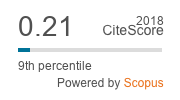Entrevista Motivacional para Estudantes da Área da Saúde: Resultados de um Treinamento
DOI:
https://doi.org/10.1590/0102.3772e3552Palabras clave:
Estudantes de graduação, Entrevista motivacional, Treinamento, Cursos da saúdeResumen
Este estudo procurou avaliar a efetividade de um treinamento em Entrevista Motivacional (EM) para estudantes do último ano de diferentes cursos na área da saúde. Usando um delineamento pré e pós-teste quase-experimental, 60 estudantes receberam um treinamento de oito horas de habilidades básicas da Entrevista Motivacional. As habilidades foram avaliadas por meio de uma vinheta clínica, das Réguas de Confiança e Importância e do Questionário de Resposta Útil, codificado utilizando o Motivational Interviewing Skill Code. O treinamento foi associado com melhora no uso das habilidades básicas da Entrevista Motivacional. Os alunos também aumentaram a percepção da importância em utilizar essas habilidades com os pacientes, mesmo com um treinamento breve.
Descargas
Citas
Bell, K., & Cole, B. A. (2008). Improving medical students’ success in promoting health behavior change: a curriculum evaluation. Journal of General Internal Medicine, 23(9), 1503-1506.
Cohen, J. (1998). Statistical power analysis for the behavioral sciences (2nd.ed.). New Jersey: Lawrence Erlbaum.
Daeppen, J. B., Fortini, C., Bertholet, N., Bonvin, R., Berney, A., Michaud, P.A., & Gaume, J. (2012).Training medical students to conduct motivational interviewing: a randomized controlled trial. Patient Education and Counseling, 87(3), 313-318.
Decker, S. E., & Martino, S. (2013). Unintended effects of training on clinicians' interest, confidence, and commitment in using motivational interviewing. Drug and Alcohol Dependence, 132(3), 681-687.
Dray, J., & Wade, T. D. (2012). Is the transtheoretical model and motivational interviewing approach applicable to the treatment of eating disorders? A review. Clinical Psychological Review, 32(6), 558-565. doi:10.1016/j.cpr.2012.06.005
Lundahl, B., & Burke, B. L. (2009). The effectiveness and applicability of motivational interviewing: A practice-friendly review of four meta-analyses. Journal of Clinical Psychology: In Session, 65(11), 1232-1245.
Madson, M. B., Loignon, A. C., & Lane, C. (2009). Training in motivational interviewing: a systematic review. Journal of Substance Abuse Treatment, 36(1), 101-109.
Miller, W. R., Hedrick, K. E., & Orlofsky, D.R. (1991). The Helpful Responses Questionnaire: A procedure for measuring therapeutic empathy. Journal of Clinical Psychology, 47(3), 444-448.
Miller, W. R., & Rollnick, S. (2002). Motivational interviewing: Preparing people for change (2nd.ed.). New York: Guilford Press.
Miller, W. R., Moyers, T. B., Ernst, D., & Amrhein, P. (2008). Manual for the Motivational Interviewing Skill Code (MISC) Version 2.1. Recuperado de http://casaa.unm.edu/download/misc.pdf.
Miller, W. R., & Rollnick, S. (2009). Ten things that motivational interviewing is not. Behavioural and Cognitive Psychotherapy, 37(2), 129-140.
Miller, W., & Rollnick, S. (2013). Motivational Interviewing: Helping people change (3rd.ed.). Guilford Press: New York.
Moyers, T. B., Martin, T., Manuel, J. K., Miller, W. R., & Ernst, D. (2007). Revised global scales: Motivational Interviewing Treatment Integrity 3.0 (MITI 3.0). Recuperado de http://casaa.unm.edu/download/miti3.pdf.
Rollnick, S., Miller, W.R., & Butler, C. (2009). Motivational interviewing in health care: Helping patients change behavior. Guilford Press: New York .
Söderlund, L. L., Madson, M. B., Rubak, S., & Nilsen, P. (2011). A systematic review of motivational interviewing training for general health care practitioners. Patient Education and Counseling, 84(1), 16-26.
White, L. L., Gazewood, J. D., & Mousey, A. L. (2007). Teaching students behavior change skills: Description and assessm. Medical Teacher, 29(4), 67-71.



